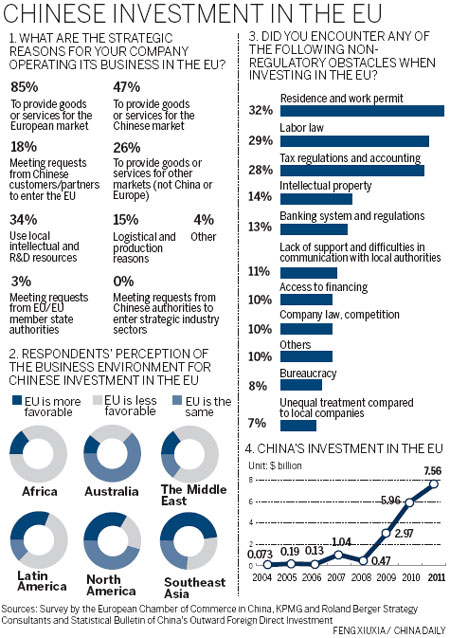In Europe for Europe
Updated: 2013-03-15 08:58
By Yan Yiqi, Cecily Liu and Zhang Chunyan (China Daily)
|
|||||||||||
Such challenges are inevitable for Chinese investors in Europe, and they need to be fully prepared for them, the EU chamber says.
"As far as operational obstacles are concerned, Chinese companies should be prepared to adapt to the market. You can look back at what European companies did in the Chinese market 30 years ago. It requires a fundamental adjustment to existing corporate strategy," Cucino says. "On the other hand, I believe that the further opening-up globally, which happened in the past 30 years, should narrow the length of this period of time for adjustment for Chinese companies."
He suggests that the EU should provide a package of easily comprehensible information regarding how to do business in Europe and how to do business in specific EU member state countries.
The EU has been China's largest trading partner for more than 10 years. Last year, bilateral trade dropped 3.7 percent to $546.04 billion. Exports from China to the EU fell 6.2 percent to $333.99 billion, and imports grew 0.4 percent to $212.05 billion.
Trade frictions have also been developing between the two sides. Sectors such as ceramics, photovoltaic and telecommunications have all become battlefields.
Experts say that because of such issues a cloud hangs over trade.
|
||||
"China and the EU are not only working together through the simple relationship of sell and buy," Yu Hongjun, vice-minister of International Department of Central Committee of Communist Party of China, said during the China-European Economic Partnership in New Era in January.
"Trade frictions between the two regions are inevitable as the Sino-EU economic relationship grows. The two sides are now negotiating investment agreements. If breakthroughs can be made, we believe the bilateral economic relationship can reach heights."
China and the EU could also start investment talks in the coming months, says Wu Hailong, the Chinese ambassador to the EU.
The EU has been a major source of China's foreign direct investment and has been an attractive destination for China's outbound direct investment.
According to the Ministry of Commerce, China has signed investment agreements with more than 100 countries and regions including Germany and France.
The EU has been a top investor in China, with $6.11 billion invested last year, the ministry says. China's investment in the EU has gained momentum since the financial crisis began to unfold.
In 2011, China's investment in the EU rose to $4.3 billion, from just $100 million in 2003. During the first half of 2012, China invested more in the EU than the bloc invested in China.
Helping hand
Chinese companies' growth in Europe has benefited many European businesses that typically work as their local distributors, suppliers or consultants.
Chinese lighting company NVC Lighting Technology, whose decision to manufacture some of its products in Birmingham, has brought growth to many component suppliers in Europe, including Tridonic, Helvar Mackwell and CP Electronics.
Kelvin Lay, of Helvar, a component supplier for NVC UK, says the company's use of European manufactured components for products sold in Europe shows its commitment to quality.
Paul Mans, managing director of CP Electronics, a British company that supplies censors to NVC UK, says the company's investment for a full support team in the UK also helps to build trust.
"In the UK, the biggest issue with importing products from China is not knowing if potential problems can be sorted out. But because NVC has a large office in the UK with lots of people with the technical expertise to help the customers, it reassures people that if a problem occurs, it can be sorted out," Mans says.
As a young business established in 2007, NVC UK already supplies to about 1,500 out of 3,500 electrical wholesalers in the UK, says director Garry Pass.
Another example of local businesses benefiting from Chinese companies' expansion is the British engineering consultancy Ricardo Plc, which recruited about 100 employees in the UK after winning a contract with the Chinese carmaker SAIC Motor Corporation Ltd in 2005.
Ricardo's task was to help SAIC establish a research and development center in the UK, training SAIC's engineers to understand how to make full use of the technology relating to the Rover 75 and Rover 25, which SAIC bought from MG Rover after the British carmaker collapsed that year.
Located in the English Midlands, the R&D center employed about 200 engineers, many of whom were former MG Rover employees.
Gary Tan, Asia president of Ricardo, says one rationale for establishing the R&D centre in the UK as opposed to China was the availability of highly skilled engineers in the English Midlands after MG Rover's collapse.

Zhang Haizhou and Ding Qingfen contributed to this story.
Contact the writers through yanyiqi@chinadaily.com.cn.
(China Daily 03/15/2013 page1)
Related Stories
Stepping stone to Europe 2013-03-15 08:58
Wind in the sails 2013-03-15 08:58
The trouble with haystacks 2013-03-15 08:58
Words of wisdom can save pain 2013-03-15 08:58
Today's Top News
List of approved GM food clarified
ID checks for express deliveries in Guangdong
Govt to expand elderly care
University asks freshmen to sign suicide disclaimer
Tibet gears up for new climbing season
Media asked to promote Sino-Indian ties
Shots fired at Washington Navy Yard
Minimum growth rate set at 7%
Hot Topics
Lunar probe , China growth forecasts, Emission rules get tougher, China seen through 'colored lens', International board,
Editor's Picks

|

|

|

|

|

|









